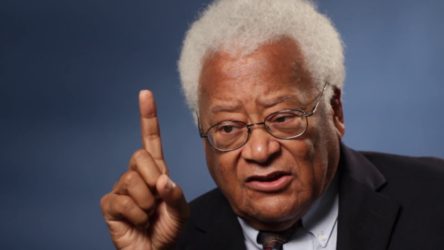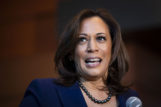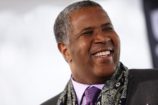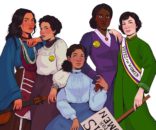 Featured – The Nonviolent Activist Who Mentored John Lewis, Rev. James Lawson. By Peter Dreier / The Progressive
Featured – The Nonviolent Activist Who Mentored John Lewis, Rev. James Lawson. By Peter Dreier / The Progressive
One of the highlights of John Lewis’s funeral on July 30 was being able to see and hear Lewis’s mentor, the Reverend James M. Lawson Jr., now ninety-one. In his twenty-one-minute eulogy at Atlanta’s Ebenezer Baptist Church, Lawson recounted the accomplishments of the civil rights movement, and the work that still needs to be done. “We will not be silent while our economy is run by plantation capitalism,” Lawson said. Read more
 We have never seen a nominee like Kamala Harris before. By Julia Craven / Slate
We have never seen a nominee like Kamala Harris before. By Julia Craven / Slate
On Tuesday, former Vice President Joe Biden, the Democratic nominee for president, selected Sen. Kamala Harris to be his running mate. The significance of this decision cannot be overstated. Harris is the first Black woman, the first Asian woman, and the first graduate of a historically Black university to be selected as the running mate for a major-party candidate. And, should the ticket be successful in November, she’d be the first woman with such a multifaceted identity to be elected vice president. Read more
Related: In Kamala Harris, a Choice at Once Safe and Energizing. By Jonathan Martin and
Related: Twitter may not like it, but Kamala Harris was probably the right choice. By Amanda Marcotte / Salon
 Every ‘Squad’ Member Won Her Primary. By Daniel Marans / HuffPost
Every ‘Squad’ Member Won Her Primary. By Daniel Marans / HuffPost
Reps. Ilhan Omar, Rashida Tlaib, Ayanna Pressley and Alexandria Ocasio-Cortez are virtually certain to head back to Congress. And new allies are joining them. “Despite all the manufactured hype and money spent attacking them, the Squad is winning, it’s growing, and is here to stay,” Justice Democrats executive director Alexandra Rojas said in a statement. Read more
 New Research Highlights Gaps In How Black And White Voters Approach Vote By Mail. By Tierney Sneed / TPM
New Research Highlights Gaps In How Black And White Voters Approach Vote By Mail. By Tierney Sneed / TPM
Hispanic and Black voters in a Philadelphia County requested mail ballots on average several days later than their white counterparts during the primary, according to an internal analysis by a voting rights group. Later application submissions, in turn, decreased the likelihood that those ballots were returned, the Pennsylvania chapter of All Voting Is Local found. Read more
 The Senate Is America’s Most Structurally Racist Institution. By Jonathan Chait / New York Magazine
The Senate Is America’s Most Structurally Racist Institution. By Jonathan Chait / New York Magazine
In a time when institutions across the country have undergone a searching self-examination, the reckoning has only begun for the most powerful source of institutional racism in American life: the United States Senate. It is not merely a problem of legacy and culture — though the Senate’s traditions are deeply interwoven with white supremacy, as Joe Biden inadvertently confessed when he touted his cooperation with segregationists — but of very-much-ongoing discrimination. Quite simply, achieving anything like functional racial equality without substantially reforming the Senate will be impossible. Read more
 In the Wake of Protests. By Charles M. Blow / NYT
In the Wake of Protests. By Charles M. Blow / NYT
We are in a period of post-mortem reflection following the time during which racial justice protests were at their most intense. We now must ask ourselves: What has changed and what hasn’t? Have power and privilege truly been disrupted? Has oppression been alleviated? What will be the legacy of this moment? Read more
Related: Are Racial Attitudes Really Changing? Some Black Activists Are Skeptical. By Astead W. Herndon / NYT
 Nation’s wealthiest Black man says corporate America should consider slavery reparations. By Catherine Thorbecke / ABC News
Nation’s wealthiest Black man says corporate America should consider slavery reparations. By Catherine Thorbecke / ABC News
The nation’s wealthiest Black man called on corporate America to step up and address inequities in society, saying companies that profited from the historic slave trade should consider paying reparations. Robert Smith, who made headlines last year when he shocked the graduating class of the historically Black Morehouse College with news that he was paying off their student debts, opened up about the private sector’s role in racial justice in an interview with Reuters published Wednesday. Read more
 The 1619 Project and the ‘Anti-Lincoln Tradition.’ By E. James West / AAIHS
The 1619 Project and the ‘Anti-Lincoln Tradition.’ By E. James West / AAIHS
For much of the century following Lincoln’s death in 1865, the president was held in high esteem within Black American communities. However, such sentiments should not obscure the complexity of Lincoln’s relationship to Black America – something embodied through his most prominent Black critic and admirer, Frederick Douglass, who in the years following Lincoln’ death would alternatively describe him as both ‘the Black man’s president’ and ‘preeminently the white man’s president.’ Read more
 Meet the Brave but Overlooked Women of Color Who Fought for the Vote. By Veronica Chambers, Jennifer Schuessler, Amisha Padnani, Jennifer Harlan, Sandra E. Garcia and
Meet the Brave but Overlooked Women of Color Who Fought for the Vote. By Veronica Chambers, Jennifer Schuessler, Amisha Padnani, Jennifer Harlan, Sandra E. Garcia and
 Racism’s Hidden Toll. In America, how long you live depends on the color of your skin. By Gus Wezerk / NYT
Racism’s Hidden Toll. In America, how long you live depends on the color of your skin. By Gus Wezerk / NYT
What’s been going on for hundreds of years is the systematic neglect of Black Americans’ health. In 2018, Black people died at higher age-adjusted rates than white people from nine of the top 15 causes of death. Read more
Related: Black psychiatrists are few. They’ve never been more needed. By Courtland Milloy / Wash Post
Related: America is failing Black moms during the pandemic. By Anna North / Vox
 40 Confederate symbols have been removed since the death of George Floyd, SPLC says. By Christina Walker / CNN
40 Confederate symbols have been removed since the death of George Floyd, SPLC says. By Christina Walker / CNN
At least 40 Confederate symbols have been removed from across the US since George Floyd‘s death in May, according to the Southern Poverty Law Center. From 100-year-old monuments to a state flag, a total of 45 have been removed or relocated from public spaces, the SPLC reported. And another 14 have been renamed, such as schools and roads. Read more
 Bill Cosby’s sex-crimes appeal attacks trial as ‘fundamentally unfair.’ By MaryClaire Dale / Associated Press
Bill Cosby’s sex-crimes appeal attacks trial as ‘fundamentally unfair.’ By MaryClaire Dale / Associated Press
It was “fundamentally unfair” for the trial judge to allow Bill Cosby’s damaging deposition from a sex accuser’s lawsuit to be used against him at his criminal trial because he believes he had a forever-binding promise from a prosecutor that he could never be charged in the case, his lawyers argued in an appeal filing Tuesday. Read more
 Strange Fruit’: The Timely Return of an Anti-Lynching Protest Song. By David Browne / Rolling Stone
Strange Fruit’: The Timely Return of an Anti-Lynching Protest Song. By David Browne / Rolling Stone
Recorded by Billie Holiday and Nina Simone, sampled by Kanye West and Rapsody, and streamed by the millions, the anti-lynching song has taken on a new relevance in the era of Black Lives Matter. Read more
 100 Years Ago, ‘Crazy Blues’ Sparked a Revolution for Black Women Fans. By Daphne A. Brooks / NYT
100 Years Ago, ‘Crazy Blues’ Sparked a Revolution for Black Women Fans. By Daphne A. Brooks / NYT
This week marks the 100th anniversary of Mamie Smith recording “Crazy Blues,” African-American women’s breakthrough into the mainstream recording industry — a feat that is stunning and impactful, yet so often misunderstood or forgotten that most people would be hard pressed to name the artist whose smash altered the course of pop. Read more
 Bob Ryland loved tennis until the very end. By Jerry Bembry / The Undefeated
Bob Ryland loved tennis until the very end. By Jerry Bembry / The Undefeated
Even at 100 years old, Robert “Bob” Ryland, the first Black man to crack the racial barrier on the mainstream professional tennis tour, maintained a thirst for the game. Quenching that thirst in recent weeks often saw Ryland at home with his hearing aid, intently listening to programming on the Tennis Channel. Read more
 How Miss Universe’s historic win helped shift the status quo for beauty standards. By Michelle Cohan / CNN
How Miss Universe’s historic win helped shift the status quo for beauty standards. By Michelle Cohan / CNN